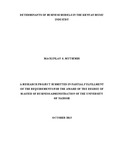| dc.description.abstract | Music is an important vehicle for cultural transmission, national identity, employment
and entertainment among other things. The Kenyan music industry offers employment
to many professionals including performers, producers, composers, writers among
others, and music has been as a tool across sectors for entertainment and educative
purposes, advertising, advocacy and just entertainment. The objective of this study
was to establish the business model determinants in the Kenyan music industry, and
this study was guided by two theories, the Theory of the Firm and the Resource Based
View. The study had a total population of the 10,215 members registered music
copyright owners under the Music Copyright Society of Kenya (MCSK).The study
used primary data which was collected using questionnaires and descriptive and factor
analysis was used to analyse the data. Among the findings from the study, ICT has
enabled for faster and cheaper distribution of music, but that live performances offered
the most revenue to artistes more than music sales and royalties. A significant number
of respondents also had low confidence and trust in the information they receive from
their CMOs with regards to royalties, and they did not feel that CMOs had had a
significant impact on policy formulation in the music industry. The study also found
out that in spite the internet offering a faster route to market for artistes, radio was still
the most powerful and preferred platform by artists, and many felt that more airplay
would lead to higher sales and concert appearances. In light of these findings, the
study recommends that policy makers in the music industry formulate policies that
allow for more airplay for local music content, as this would have a multiplier effect
on brand development, music revenues earned and general industry growth, since live
music performances has been identified as one key source of revenue in artiste’s
business models, and radio as the most powerful platform for value addition and route
to market. Also, the study recommends that CMOs need to invest in systems that will
enhance transparency and build artiste’s confidence in them, since CMOs are better
placed as bodies with the mandate to influence the development of policies and
structures in the music industry. | en_US |

